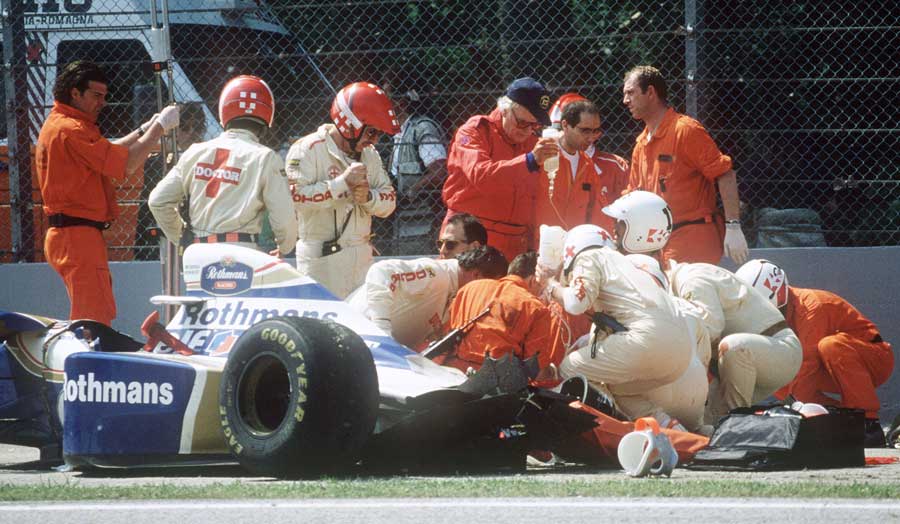- 1994
Death of a legend overshadows Schumacher's first title

Season's results | Drivers' Championship | Constructors' Championship
It was a very bad year, a championship horribly marred by Senna's death and further spoiled by controversy. The title race went down to the wire in Adelaide and then Michael Schumacher clinched the crown -- in questionable fashion.
For the second year running, Williams started the year without its World Champion, with Alain Prost having been replaced by Ayrton Senna, a driver who Frank Williams had been trying to get to sign for his team for a decade. His ride at McLaren was taken by Martin Brundle, but he and Mika Hakkinen weren't to enjoy a strong year as the team's Peugeot engines were poor.
With Riccardo Patrese having retired after 17 seasons, there was a vacancy at Benetton and this was filled by JJ Lehto, with his seat at Sauber going to Heinz-Harald Frentzen who came as part of the deal with Mercedes engines.
Ferrari retained Jean Alesi and Gerhard Berger. Here the main change was that team boss Jean Todt - who had arrived midway through 1993 - was transforming the way that this team ran in an attempt to stop it squandering its budget and become truly competitive again.
Despite enjoying a decent 1993 campaign, Ligier changed both drivers again, with Eric Bernard and Formula 3000 champion Olivier Panis replacing Mark Blundell and Brundle, with Blundell moving on to Tyrrell.
After his strong showings at the end of 1993, Eddie Irvine stayed with Jordan as team-mate to Rubens Barrichello. As finding a budget was proving a perennial problem, Minardi and the Lola BMS Scuderia Italia combined forces, with Pierluigi Martini coming from the former and Michele Alboreto from the latter.
Again, there were new teams, this time with Pacific stepping up after great success in the junior formulae, with Bertrand Gachot and Paul Belmondo as its drivers. Another British team, Simtek, joined them, but this was one created from scratch, with David Brabham and Roland Ratzenberger.
Senna seemed sure to win the title now that he'd joined Williams, but this isn't how it worked out. Indeed, by the time of his death, the Brazilian had scored no points from the first two races, while Schumacher had two wins to his credit for Benetton.
With driver aids such as traction control banned and refuelling now a prerequisite, Senna led in Brazil, but Benetton were kings of the pit stop and had Schumacher back out in the lead. Senna spun into retirement in his efforts to keep up, letting team-mate Damon Hill finish second in a race that lost Bernard, Brundle, Irvine and Jos Verstappen in a spectacular shunt for which Irvine was blamed.
The new TI Circuit in Japan was next, but Senna was tipped into the gravel at the first corner by former team-mate Mika Hakkinen. This left Schumacher clear to win from Berger and an ecstatic Barrichello.
Then came Imola. Ratzenberger hit a wall at 190mph in qualifying and died. Then Senna crashed out of the lead at the Tamburello kink, suffering fatal injuries, leaving Schumacher to score a cheerless win.
At Monaco, Schumacher made it four from four, with Martin Brundle 37s behind and Berger third. Sauber's Karl Wendlinger had crashed in qualifying and was in a coma for three weeks before making a full recovery. At Barcelona, Schumacher became stuck in fifth gear. Hill went by, but the German hung on to finish second, with Blundell third for Tyrrell.
Schumacher then beat Hill by 40s in Montreal, where Senna's replacement David Coulthard scored his first points, even leading early on. Renault paid for Nigel Mansell to make a one-off return for Williams at Magny-Cours. Despite qualifying on the front row with Hill, Schumacher blasted past both at the start to win.
Schumacher broke grid order at Silverstone, passing poleman Hill on the parade lap. He was shown the black flag, but ignored it, earning a two-race suspension. Eventually, he came in for his stop-and-go penalty, so Hill won. His suspension was deferred, but victory at Hockenheim went to Berger, breaking a 58-race drought for Ferrari. The race is recalled more for a pit fire that engulfed Verstappen's Benetton.
Schumacher and Verstappen sandwiched Hill in first and third in Hungary. Then Schumacher won from Hill and Hakkinen in Belgium, but he'd ground away too much of his "plank" (a strip on the underside of the car), and was disqualified.
Schumacher missed Monza and Estoril, with Hill winning both. Then Schumacher beat Hill at Jerez when the Williams wouldn't take on its fuel. Schumacher led at Suzuka, but the wet race turned when he chose to pit twice, Hill just once. It was a vital win, as Schumacher's points lead was cut to one.
Just before mid-distance in the Adelaide shoot-out, Schumacher grazed a wall. Hill dived for a gap and the German, knowing that his car was damaged, drove into him. This made Schumacher champion, as Hill's car was also too damaged to go on, leaving Mansell to win from Berger.
Reproduced from The Ultimate Encyclopedia of Formula One published by Carlton Books